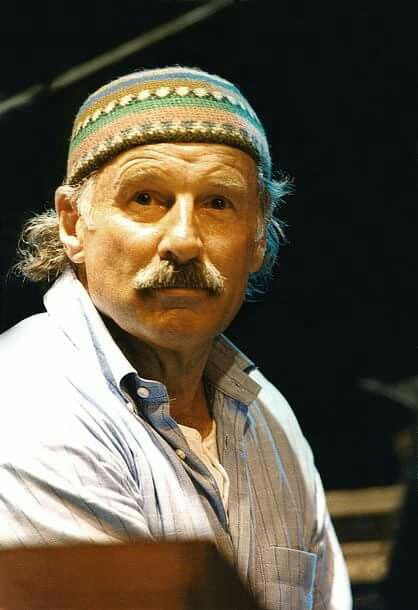Joe Nails It
An assist from Joe Zawinul

Joe Zawinul
It was so gratifying to find Joe Zawinuls’s 2000 interview about music synthesizers in the Daily Bruin during the eighteen months I had my UCLA appointment there, my project consisting of transferring rare field recordings onto CDR. I made a point to clip the interview, now yellowed, making sure it would always be available for reference. Now, I'm finally getting around to addressing Zawinul's important contribution for raising music consciousness in a specific writing. Even more, I just checked, and the interview is online, too. The superb interviewer, Chris Young, states in his opening paragraph: "But not many people have noticed the synthesizer’s enormous possibilities.” Given that most of the music we experience is in the form of recorded sound, what is the difference, for example, of a clarinet played by an actual musician, or by the Meruvina under my control? Is either of these sounds less or more real? Does a traditional clarinetist feel music more deeply than myself, or does it require more depth and spirituality to recreate a clarinet without the physical object? Is one approach more valid than another? What's important is the musicality of the clarinet presented within the context of the music being performed. Certain expressive and technical characteristics, virtues for the music of Mozart or Brahms, may not be virtues for my compositions, requiring a different vision of clarinet performance more germane to the Meruvina. To insist upon only having a musician play the clarinet in conventional fashion strikes me as being materialistic and superficial, and the old disproven fear that machines will replace people in music must not be allowed to interfere with a composer's artistic vision if the Meruvina is preferred. My vote is for traditional musicians and the Meruvina to coexist, each having their irreplaceable presence in the music world, with the Meruvina name also referencing software and hardware that works similarly if by different monikers. For example, together with my compositions and performances for Meruvina, I've now added piano improvisations, enjoying tremendously making music this more traditional way, too. A new album of piano improvisations mostly based on ragas will be released soon. Now to Joe Zawinul's words of gold. Addressing the sentiment that some may still have even today, that electronic instruments are fundamentally inferior, Zawinul, an electric piano and synthesizer pioneer deeply touched by jazz and world music, states: “Whoever thinks that an instrument itself is important doesn’t know anything about music, because the instrument doesn’t play itself, he said. “The person behind the instrument is the issue; the instrument itself is nothing. We make it something. When Miles Davis plays four notes on the trumpet, he makes it something. Some other people could play a thousand notes and say nothing.” Zawinul, a native of Austria, continues: “The synthesizer deals with many textures, and it takes a lot of talent to make those textures speak. Somebody who plays the piano and wants to play with synthesizers, and doesn’t totally change their concept of thinking musically, will always remain a piano player and a bad synthesizer player,” he said. Amen to both statements. While the quotes above do not specifically mention computers, Zawinul used computers for his music in a manner similar to myself at least ten years before the interview, so he obviously includes computers as musical instruments in his thinking, their being a natural extension of musical digital technology if not the essence of such technology itself, including having the same principles apply as stated in the above paragraphs. One of my very few essential composition teachers, the brilliant and charismatic Don Funes (my understanding is that I was the only student during his time at the Crane School of Music that he gave private composition lessons to, arranged by the Composition Department Chair, Elliot DelBorgo), was fond of saying that making music electronically was more difficult than the traditional way. Maybe that’s true, not that it ultimately matters, the end result being the important thing. Incidentally, my private lessons with Don focused on compositions for conventional musicians, my working with early incarnations of the Meruvina coming years later. During one of our lessons, Don stunned me by stating: "That's part of your genius." He also said he didn't understand my definition of quality in music, this part of a class assignment, so I was glad to explain it to him, "jewel" representing the individuality of the utterer, with "lotus" representing the world. Quality is epiphany illuminated by a jewel of the lotus. Kyle Gann, a professor at Bard College, where I have lectured, observes in his passionate, on target 2006 essay, Post Semester Rampage, Electronic Version, that its foolish and self-defeating to insist upon silly, irrelevant rules and conventions having nothing to do with actual music within the domain of computer and electronic music usage. Amen to that, too. Beyond recorded music, what of Richard Wagner's preference for musicians to be heard and not seen? This entails a visual spectacle, singing actors in the case of Wagner and his Operas or Music Dramas, regarded as more eventful than watching instrumentalists perform. Such settings would seem ideal for the Meruvina beyond recordings, but I've only given several "music installations" to date while remaining focused on having my compositions and performances recorded. - Michael Robinson, August 2018, Los Angeles
© 2018 Michael Robinson All rights reserved
Michael Robinson is a Los Angeles-based composer and writer (musicologist). |